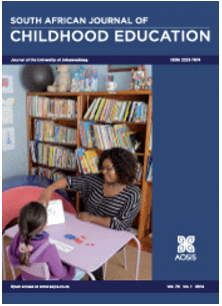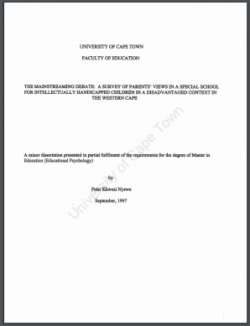Exploring the creative adjustment of middle childhood boys in a boarding school in the Nkangala district, Mpumalanga

Type
Thesis
Authors
Category
ECCE, Foundation, Intermediate
[ Browse Items ]
Publication Year
2011
Publisher
North West University, Potchefstroom, South Africa
URL
[ private ]
Pages
136 p.
Subject
Early childhood education, Foundation Phase, Intermediate Phase, Primary education, Boarding schools, Learners, Middle childhood, Care-giving duties, Disruptive behaviour, Learner discipline, Creative adjustment, Gestalt Therapy Theory, Nkangala District
Tags
Abstract
The boarding school with which this study is concerned, is connected to the only primary school with boarding facilities in the local municipality in the Nkangala District. It is home during the week to twenty–nine girls and fifty boys. Following the withdrawal of funding by the Department of Education in 2004, the Governing Body kept the boarding school open since there was demand for the service it offered. Two adults rotate care–giving duties in the boys’ residence, so that one adult at a time is responsible for the care of fifty boys. According to the boarding school staff, the boys typically disregard boundaries, are often disrespectful, aggressive, bully others and use swear words. The motivation for this study had its roots in the personal interest of the researcher, who did her practical component for Masters Studies at The Boarding School in 2009, and noticed that the boys were mostly referred for therapeutic intervention due to disruptive behaviour and discipline problems/acting out behaviour. The causes for the abovementioned difficulties might have originated in the living situations of these children before they were placed in boarding school. This is a vulnerable group of learners with complicated psycho–social dynamics. The researcher was interested in the way in which the boys made or resisted contact as part of their creative adjustment, since this could provide insight into their behavioural problems and discipline issues within the boarding school context. The general aim of this research was to explore and describe the creative adjustment of middle childhood boys in a boarding school in the Nkangala District, Mpumalanga. To achieve this goal, a qualitative study was undertaken. Although it was not the focus of this research, the exploration of the creative adjustment of the boys gave insight into how intervention and support strategies might be structured, in order to maximize the development of these learners. The research process commenced with a literature study, focused on the researcher’s theoretical paradigm and to identify other research in the field. A group meeting was held with the child participants and boarding school caregivers to build relationships, and to discuss and explain research aims. Demographic details of the child participants were collected from their boarding school registration forms. Data was also obtained from the eight child participants by means of semi–structured interviews during three separate, individual sessions. Data was obtained by means of an interview with the boarding school caregivers to triangulate demographic details and the broad themes that emerged from the interviews with the child participants. A detailed literature study was done from a theory after mode, to circumvent the influence from literature when identifying themes. Gestalt Therapy Theory literature was integrated into the coding and analysis processes. The research process was in keeping with the researcher’s paradigms of interpretevist–constructivism, phenomenology and field theory. Lastly, the creative adjustment of the middle childhood boys in the boarding school was described, and recommendations regarding intervention and support were compiled in a report.
Number of Copies
1
| Library | Accession No | Call No | Copy No | Edition | Location | Availability |
|---|---|---|---|---|---|---|
| 1 | Potchefstroom, North West Province, South Africa | Yes |

